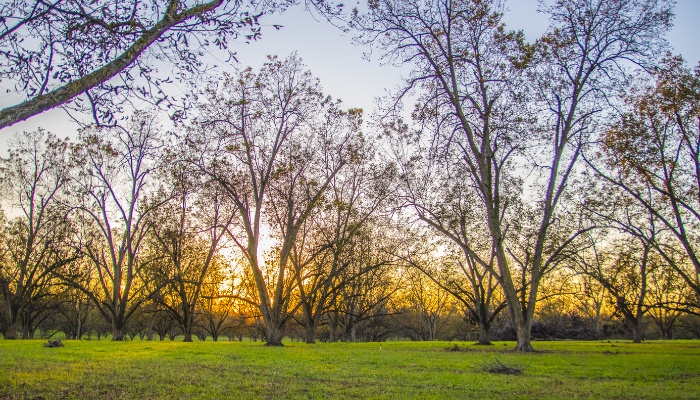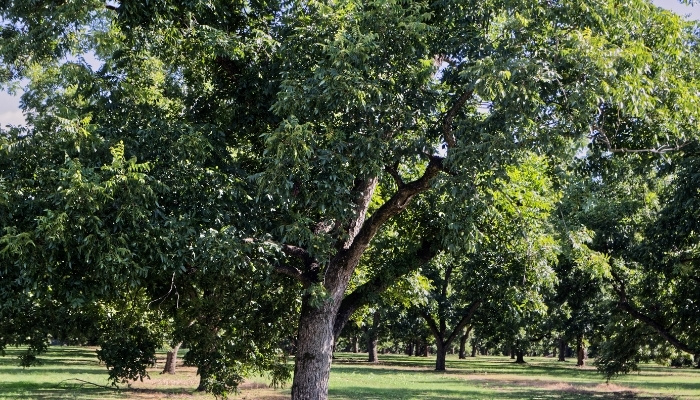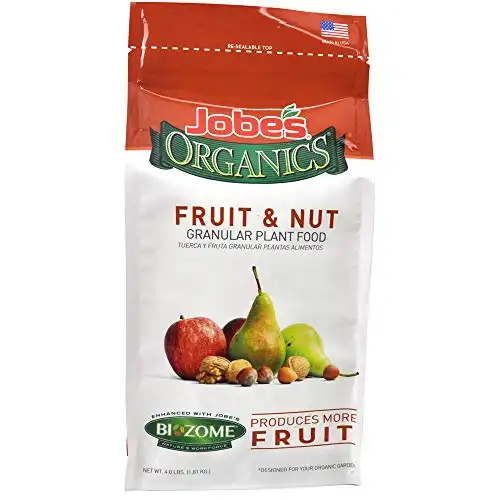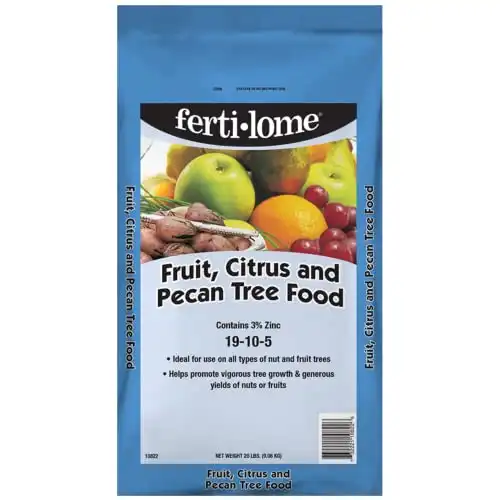Gardeners are typically conscientious when it comes to fertilizing their flower and vegetable gardens, yet they often fail to adequately nourish their large trees.
Pecan trees grow to be majestic and stately, but in order to remain healthy and productive, they need nutrients just like any other plant.
Pecan trees are typically fertilized in late winter to early spring before the growing season begins. The exact timing can vary depending on the location, but it’s important to apply fertilizer before bud break to ensure the nutrients are available when the tree needs them most.
In this article, we will explore the best practices for fertilizing pecan trees, including when to fertilize, what types of fertilizer to use, and how to apply it effectively.
This guide will provide you with the knowledge you need to keep your trees healthy and productive for years to come.
Key Takeaways:
- Nitrogen, phosphorus, potassium, zinc, and other nutrients are essential for pecan tree growth and development.
- Young trees require more frequent applications of smaller amounts of fertilizer.
- Ammonium sulfate and zinc are particularly important for pecan trees.
- Nutrient deficiencies in pecan trees can cause reduced nut production and stunted growth and increase susceptibility to pests and diseases.
- Mulching, composting, cover crops, green manure, and biofertilizers can effectively improve soil health and provide nutrients to the pecan tree.
- Pecan trees do not produce nuts every year, alternating cycles of heavy and light nut production.
Fertilizing Pecan Trees
Without regular applications of fertilizer, pecan trees may continue to cycle through the seasons on their own, but once you begin giving them what they need to thrive, you’ll see a big difference in overall health and production.
The Importance of Fertilizer
Nut trees require a range of nutrients to grow and produce an abundant crop, and fertilizer provides these nutrients in the right balance to support the tree’s health and growth.
Nitrogen is one of the most important nutrients for nut trees as it is essential for the development of leaves and stems and is important for the formation of proteins and other compounds.
Nut trees may experience stunted growth, yellowing leaves, and a reduced yield without enough nitrogen.
Phosphorus is critical for the development of healthy roots and overall tree growth. It plays a key role in energy transfer within the tree and helps to promote strong, healthy root systems.
A deficiency in phosphorus can result in stunted growth, poor fruit quality, and reduced yield.
Potassium is involved in many important physiological processes, including regulating water balance, forming sugars and starches, and moving nutrients within the tree.
A lack of potassium can result in poor root development, leaf yellowing, and reduced crop yields.
- Nitrogen (N) is important for leaf growth and overall tree vigor.
- Phosphorous (P) is necessary for root development, fruiting, and production.
- Potassium (K) is essential for disease resistance, water management, and stress tolerance.
In addition to these three macronutrients, nut trees also require a range of micronutrients, including calcium, magnesium, and zinc, to name a few.
Fertilizers that are specifically formulated for nut trees typically contain all of these essential nutrients in the right balance to ensure that the trees have everything they need to grow strong and healthy and produce a bountiful crop.
Pecan Tree Nutrient Requirements
In addition to the macronutrients nitrogen, phosphorus, and potassium, pecan trees require adequate levels of calcium, magnesium, sulfur, and zinc.
Calcium is essential for proper cell wall formation, and helps to promote strong, healthy stems and branches.
Calcium is also important for the development of nut shells, and a lack of calcium can result in thin, weak shells that are more susceptible to damage and disease.
Magnesium is involved in the production of chlorophyll, the pigment that gives leaves their green color and is necessary for photosynthesis.
It also helps to regulate the uptake of other nutrients, and a deficiency in magnesium can result in yellowing leaves and poor overall tree health.
Sulfur is important for the formation of amino acids and other essential compounds and is necessary for the development of proteins and enzymes.
Sulfur is also involved in the production of chlorophyll, and a deficiency in sulfur can result in yellowing leaves and reduced growth.
Zinc is essential for the development of leaves and new shoots and is important for overall tree growth and health.
It is involved in the production of auxins, which regulate growth and development, and a lack of zinc can result in stunted growth, small leaves, and reduced crop yields.
| Nutrient | Macro/Micro | Function |
|---|---|---|
| Nitrogen | Macro | Leaf and stem growth, overall tree vigor |
| Phosphorus | Macro | Root growth, fruit development |
| Potassium | Macro | Water balance, overall tree health |
| Calcium | Macro | Cell wall development, enzyme function |
| Magnesium | Macro | Photosynthesis and chlorophyll production |
| Sulfur | Macro | Amino acid production, protein synthesis |
| Iron | Micro | Chlorophyll production, photosynthesis |
| Manganese | Micro | Nitrogen metabolism, antioxidant function |
| Zinc | Micro | Nut production, overall tree health |
| Copper | Micro | Enzyme function, chlorophyll production |
| Boron | Micro | Cell division, overall tree health |
| Molybdenum | Micro | Nitrogen fixation, overall tree health |
Correct Time To Fertilize Pecan Trees
Generally, the best time to fertilize pecan trees is in the early spring before bud break. This is typically in late February or early March, depending on the climate and location.
The reason for fertilizing in early spring is that the nutrients provided by the fertilizer are most readily available to the tree during its active growth period.
As the tree emerges from dormancy in the spring, it requires a significant amount of energy and nutrients to support new shoot growth and leaf development.
By applying fertilizer at this time, the tree is able to utilize these nutrients more efficiently and effectively, leading to stronger growth and improved crop yields.
Fertilizing too early before the soil has warmed up sufficiently can result in slow nutrient uptake and can also increase the risk of nitrogen leaching, which can be harmful to the environment.
Fertilizing too late, on the other hand, can result in the tree being unable to fully utilize the nutrients before the end of the growing season, which can lead to a reduced crop yield.

Fertilizing Young vs. Mature Pecan Trees
Young pecan trees require more frequent fertilization than mature trees as they are still developing their root systems and need more nutrients to support their growth.
Typically, young trees are fertilized every 4-6 weeks during the growing season, starting in the second year after planting. Fertilizer is applied in a band around the tree, about 12-18 inches from the trunk, and is watered in thoroughly after application.
The type of fertilizer used for young trees is typically high in nitrogen to promote vigorous growth and establish a strong root system. A fertilizer with a ratio of 20-10-10 or 16-4-8 is often recommended for young pecan trees.
As pecan trees mature, their nutrient requirements change and require less frequent fertilization. Mature pecan trees are typically fertilized once or twice a year, in the early spring and/or late summer or early fall, depending on the climate and location.
The type of fertilizer used for mature trees is often lower in nitrogen and higher in phosphorus and potassium to support fruit development and overall tree health. A fertilizer with a ratio of 12-6-6 or 10-10-10 is often recommended for mature pecan trees.
When applying fertilizer to mature trees, it is important to apply it evenly over the entire root zone, which extends out to the dripline of the tree. This can be done using a broadcast spreader or by hand, and the fertilizer should be watered in thoroughly after application.
How To Fertilize Pecan Trees
Here are step-by-step directions for how to fertilize pecan trees:
- Conduct a soil test: This shows the pH level and nutrient deficiencies and will help you determine the type and amount of fertilizer you need to apply.
- Choose the right fertilizer: Typically, a balanced fertilizer with a nitrogen-phosphorus-potassium (NPK) ratio of 12-6-6 or 10-10-10 is recommended for mature trees.
- Determine the appropriate amount of fertilizer: The amount depends on the age and size of your pecan tree. Refer to the fertilizer label, or consult a local nursery or agricultural extension office for specific guidelines.
- Apply the fertilizer: Start about 12-18 inches away from the trunk, and extend out to the dripline of the tree. Avoid getting fertilizer on the trunk or foliage.
- Water in the fertilizer: Water the area thoroughly to help the nutrients penetrate the soil and reach the tree roots. Water until the soil is moist but not saturated.
- Repeat as needed: Depending on the age and size of your pecan tree, you may need to fertilize once or twice a year. Follow the product recommendations.
How Often To Fertilize Pecan Trees
The frequency of fertilization for pecan trees depends on the age and size of the tree as well as the soil nutrient levels and the type of fertilizer being used.
Young trees are typically fertilized every 4-6 weeks during the growing season, starting in the second year after planting.
Mature pecan trees are typically fertilized once or twice a year in the early spring and/or late summer or early fall.
Additional fertilization may be needed to maintain tree health and productivity if the soil is deficient in nutrients.
Slow-release fertilizers can be applied less frequently, while quick-release fertilizers may need to be applied more often.
It’s important to note that over-fertilizing can lead to excess salt buildup in the soil, which can harm the tree roots and reduce tree growth and nut production.
It’s always best to follow soil test recommendations and fertilization guidelines specific to your location and tree age to ensure proper fertilization.
Best Fertilizer for Pecan Trees
A balanced fertilizer with an NPK ratio of 12-6-6 or 10-10-10 is typically recommended for mature pecan trees. This means that the fertilizer contains 12% or 10% nitrogen (N), 6% or 10% phosphorous (P), and 6% or 10% potassium (K) by weight.
In addition to the NPK ratio, pecan tree fertilizers may also contain micronutrients such as calcium, magnesium, sulfur, zinc, and boron.
These micronutrients are important for pecan tree growth and health, and a complete fertilizer that includes these nutrients can help ensure that your pecan trees are getting all the nutrients they need.
Carl Pool Pecan Special Fertilizer
This unique blend contains three forms of nitrogen in addition to phosphate, potash, sulfur, soluble zinc, and chelated zinc. Mix with water, and liberally apply to the entire tree.
As a foliar food, it is not ideal for large mature trees, but it is perfect for young trees.
Jobe’s Organics Fruit & Nut Fertilizer
This organic choice has an NPK of 3-5-5 and contains calcium, magnesium, sulfur, beneficial bacteria, and soil-improving fungi.
This fast-acting granular fertilizer is ideal for new plantings as well as established, mature trees.
Fertilome Fruit, Citrus and Pecan Tree Food
A mix specially created with pecan trees in mind, Fertilome has an NPK of 19-10-5 and contains copper, boron, iron, manganese, and two forms of zinc.
To apply, simply broadcast 2.5-3 pounds of fertilizer per inch of trunk diameter in the spring and again after harvest.
Ammonium Sulfate for Pecan Trees
Ammonium sulfate is a fertilizer that can be particularly beneficial for pecan trees due to its high nitrogen content and ability to lower soil pH.
Ammonium sulfate should be applied in the early spring before new growth appears. This timing allows the tree to absorb the nitrogen as it begins to grow for the season.
In general, apply 1 pound of ammonium sulfate per inch of trunk diameter, up to a maximum of 10 pounds per tree per year.
Spread the ammonium sulfate evenly around the tree, avoiding direct contact with the trunk. Water the area after applying the fertilizer to help it soak into the soil.
Check the soil pH regularly to ensure that it remains within the optimal range for pecan trees. If the soil pH is too high, additional applications of ammonium sulfate may be needed to lower it.
Zinc Fertilizer for Pecan Trees
Zinc is an essential micronutrient for pecan trees as it plays a critical role in the formation of enzymes and proteins, helps regulate photosynthesis and hormone production, and helps increase resistance to certain diseases.
Zinc sulfate is the most common form of zinc used in pecan tree fertilization, but zinc chelates may also be used as they are more easily absorbed by the tree roots.
Zinc can be applied to pecan trees in the spring or fall, but avoid applying zinc during extreme heat or drought periods.
A soil test can help determine the appropriate rate of zinc to apply, but in general, apply 2-4 pounds of zinc sulfate per acre of soil or 1-2 teaspoons of zinc chelate per tree.

Nutrient Deficiency in Pecan Trees
The causes of nutrient deficiencies in pecan trees can be due to poor soil conditions, inadequate fertilization, or other environmental factors that prevent the tree from accessing necessary nutrients.
Signs of nutrient deficiencies in pecan trees can vary depending on the specific nutrient that is lacking.
For example, nitrogen deficiencies can cause yellowing of leaves and stunted growth, while phosphorus deficiencies can cause a reduction in root growth and poor nut production.
Zinc deficiencies can cause leaves to turn yellow or white with stunted growth and reduced nut production.
Deficiencies can lead to reduced nut production, stunted growth, and increased susceptibility to pests and diseases. In some cases, severe nutrient deficiencies can lead to the death of the tree.
Therefore, it is important to ensure that pecan trees have adequate access to essential nutrients through proper fertilization and soil management.
How To Add Nutrients To Soil Naturally
Adding nutrients to the soil under pecan trees naturally can be accomplished through a variety of methods, including:
- Mulching: Adding organic mulch such as leaves, grass clippings, or compost around the base of the tree can provide a slow-release source of nutrients as the mulch breaks down over time.
- Compost: Spreading aged compost can provide a rich source of nutrients for the tree.
- Cover crops: Clover, rye, or vetch planted in the area around the pecan tree can help fix nitrogen in the soil, which can benefit the tree and surrounding plants.
- Green manure: Planting nitrogen-fixing plants like legumes in the same area as the pecan tree can help increase soil fertility.
- Biofertilizers: Adding biofertilizers such as mycorrhizae or other beneficial microorganisms to the soil can help improve nutrient uptake by the tree and improve soil health.
Natural methods of adding nutrients to the soil may take longer to provide the necessary nutrients than chemical fertilizers, and the soil nutrient levels should be monitored to ensure the tree is receiving adequate amounts of essential nutrients.
Related Questions:
Do Pecan Trees Produce Every Year?
No, pecan trees do not produce nuts every year. Pecan trees have a tendency to produce in alternate years, with a heavy crop one year and a light crop the following year.
The amount of nut production can also be influenced by various factors such as weather, pollination, and disease.
Do Pecans Trees Stop Producing When They Get Old?
Pecan trees do not necessarily stop producing when they get old. However, their nut production may decrease and become less consistent as they age. Proper care and maintenance can help to prolong the productivity of pecan trees.
Final Thoughts
The nutrient requirements of pecan trees include a combination of macro- and micro-nutrients, each with specific functions critical to the tree’s overall growth and development.
Careful attention should be paid to the timing and amount of fertilizer application, with the frequency and quantity of fertilization varying depending on the age of the tree.
Nutrient deficiencies can lead to reduced nut production, stunted growth, and increased susceptibility to pests and diseases, highlighting the importance of proper fertilization practices.
Ultimately, with careful management and attention to the nutrient needs of pecan trees, growers can ensure healthy, productive trees for years to come.



